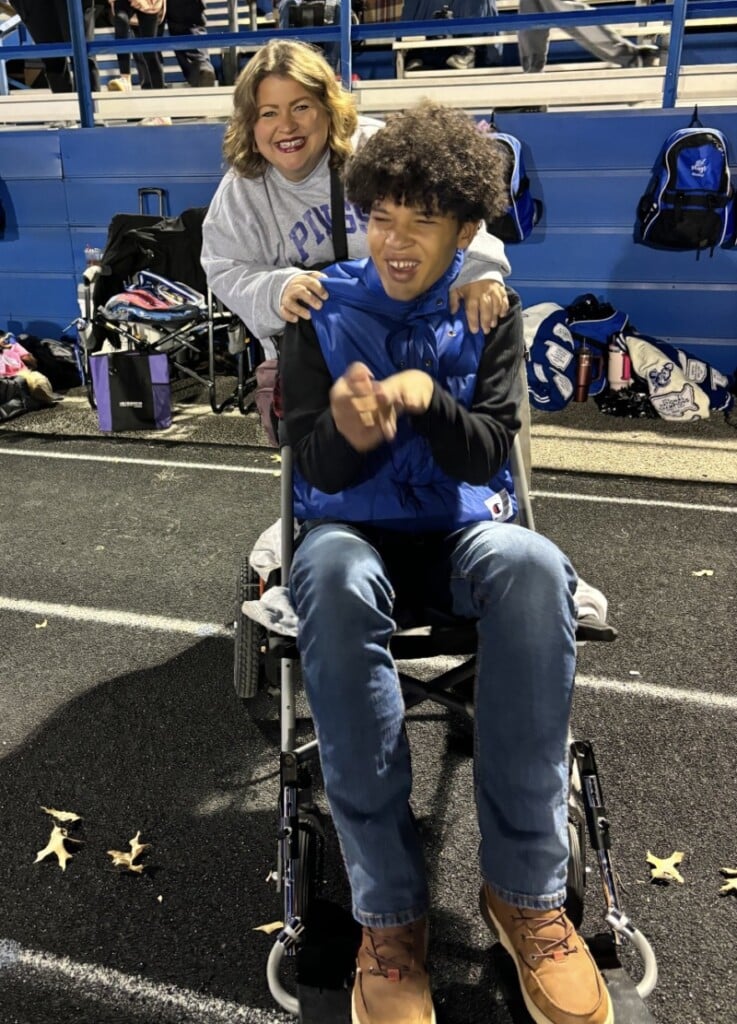Understanding Developmental Disabilities and Delays

March is National Developmental Disabilities Awareness Month. We asked Andee Cooper at Sooner SUCCESS to answer questions about what parents should know about developmental disabilities (DD). Besides her professional credentials, Andee Cooper is a mom to a young person with developmental disabilities.
Q: What are developmental disabilities (DD), and what is a developmental delay?
A: Developmental disabilities can be a group of conditions due to an impairment in one or more developmental domains: physical, learning, language or social emotional. A developmental disability happens during the early stages of development, even starting in utero. A developmental disability can impact a child’s ability to function in daily living skills and tasks.
A developmental delay occurs when a child does not meet one or more developmental milestones. A milestone is what a child can typically do by a certain age. These delays may be an indicator of a developmental disability. Some delays, with early intervention, can be resolved by therapeutic intervention and exposure to typically developing peers. A developmental disability, on the other hand, is more likely to be lifelong and will impact everyday life.
Q: What are some developmental milestones in infants?
A: The great thing about infants is they are resilient. When we do see developmental delays, there are so many great steps to take in order to receive support.
In infancy, milestones are ever-changing, and the CDC publishes a great milestone checklist as well as a mobile app; you can record milestones for your baby for yourself, and also to report to your baby’s pediatrician.
A few examples of social milestones:
- calming down when picked up
- seems happy to see you
- smiles
A few examples of language milestones:
- making sounds (not crying)
- cooing
- reacting to loud noise
A few examples of cognitive milestones:
- watches you move
- looks at a toy
- looks at hands with interest
A few examples of physical milestones:
- holds head up when on tummy
- moves arms and legs
- brings hands to mouth
Q: If parents are concerned, what should they do?
A: If your child is not meeting developmental milestones, you should talk to your child’s pediatrician. Take notes of your concerns so you are able to articulate in your appointment what your child is or is not doing that concerns you.
Q: What are some resources for parents of young children (younger than age 5) who have developmental disabilities?
A: There are some wonderful resources for parents raising children with developmental delays and disabilities. If you or your child’s pediatrician have concerns, you can self-refer, or a pediatrician can refer to Sooner Start. Sooner Start is Oklahoma’s early intervention program designed to support families with infants and toddlers with developmental delays or disabilities.
If a child qualifies for this free service, an Individual Family Service Plan (IFSP) is developed, and goals are created to support the child’s growth in their home environment. Services can be provided by a physical therapist, occupational therapist or speech therapist.
Parents can also self-refer or have a referral submitted by a physician to Sooner Success. Sooner Success is a statewide agency supporting families raising children with special health care needs. Sooner Success coordinators work to meet families where they are, connect them to resources and advocate for a comprehensive, coordinated system of health, social and educational services.
Q: What can parents do to help their young child who has a developmental disability?
A: It is important for young children to engage in early intervention services and supports, but it is also widely studied that a child with a developmental delay or disability should continue to be exposed to peers who are typically developing to promote growth in their language, social and cognitive development.
Tulsa Educare and CAP Tulsa are leading the way in early childhood education. Both agencies accept children with developmental disabilities and offer fully inclusive programming. They do an incredible job supporting the child and family by connecting them to many of the services the state has to offer, like Sooner Start or their local education agency/public school.
Parents also have to remember to take time for themselves. Raising a child with a developmental disability can be very rewarding but can also be very tiring. Parents often share feelings of fatigue, loneliness and isolation.
Andee offers the following advice: As a parent raising a child with a developmental disability, I strongly encourage you to find your village. Find the people who love and support you and your child. Take breaks and don’t be afraid to ask for help. Parents have to continue to thrive to be their best, most patient self for their children.
Q: What can others do to support a parent who has a child with developmental disabilities?
A: If you have a friend who is raising a child with a developmental delay or disability, be there for them. Listen and truly try to be a support. They will receive loads of advice and recommendations. Do not try to diagnose, as there are licensed professionals available to provide a comprehensive evaluation to each individual. Accept your friends and their children. Make sure you stay a safe place for them to come because the road to a diagnosis can be incredibly lonely. Open your heart to see the value in all children and their unique abilities.




